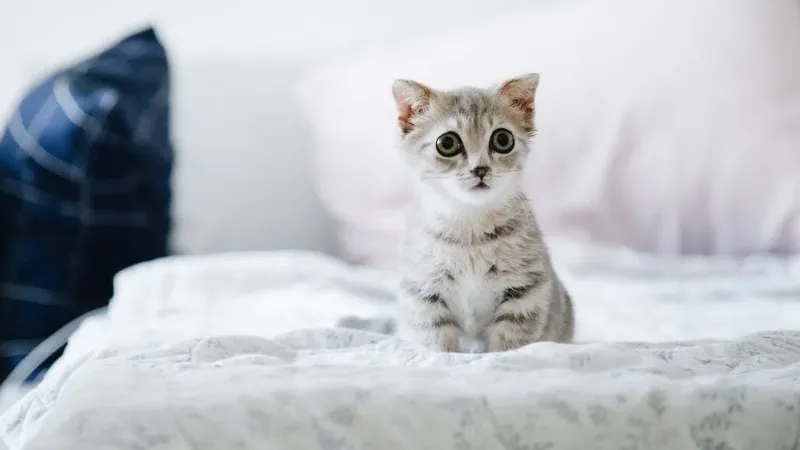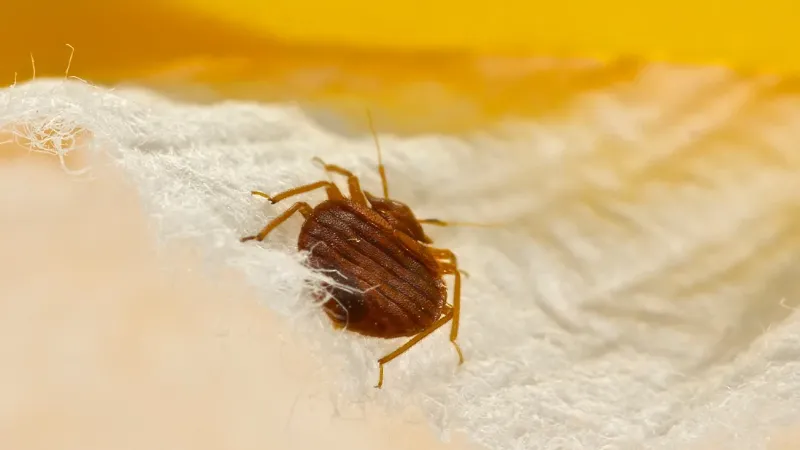Understanding the “Why is my cat peeing on my bed?” will help you figure out what is really going on inside of your furry feline’s head, so you can then determine how to stop this unwanted behavior.
Why is my cat peeing on my bed? Maybe the recent changes in the household, dirty litter box, litter box position, need more litter boxes, dislikes the style of their litter box, finds the litter unpleasant.
Let’s have a closer look.
Why is My Cat Peeing on My Bed?
Once you rule out health reasons for your cat’s strange new behavior it is time to consider other possible reasons why your cat is choosing to pee on your bed. The following list includes a few of the most typical.
Recent Changes in the Household
Your cat enjoys consistency. A change in the household, such as a new pet or a person moving in or out, can cause issues with soiling outside of the litter box. Maybe you started a new job and are spending more time away from home.
To help your cat feel safe and secure despite the recent change, make sure you spend a little extra time with them. This behavior ought to stop on its own once your cat feels secure and safe once more with a little extra love and care.

Dirty Litter Box
Sense of smell is extremely acute in cats. Your cat may not be using their litter box due to a number of factors, one of which is that it is not being kept clean enough. If you use clumping litter take a few minutes every day to clean the clumps and any solid waste out your cat’s box, and replace litter weekly. If you use non-clumping litter, be sure to perform a complete litter change at least twice a week. If, however, you have a particularly picky cat, you may need to perform a litter change every other day to satisfy your feline friend.
Litter Box Position
Cats are surprisingly picky about where their tiny box is placed. To relieve themselves, cats need to feel safe and secure. If your cat’s little box is located in a busy area, this may be the problem.
It is also important to note that cats will not urinate or defecate near food. This means that your cat may not use their litter box if it is located too near their food and water bowls.
Sometimes cats need more light, or perhaps the location of the cat’s litter box forces you to walk past your dog’s favorite spot.
It’s simple to move your cat’s litter box, which might help your feline companion stop urinating on your bed.
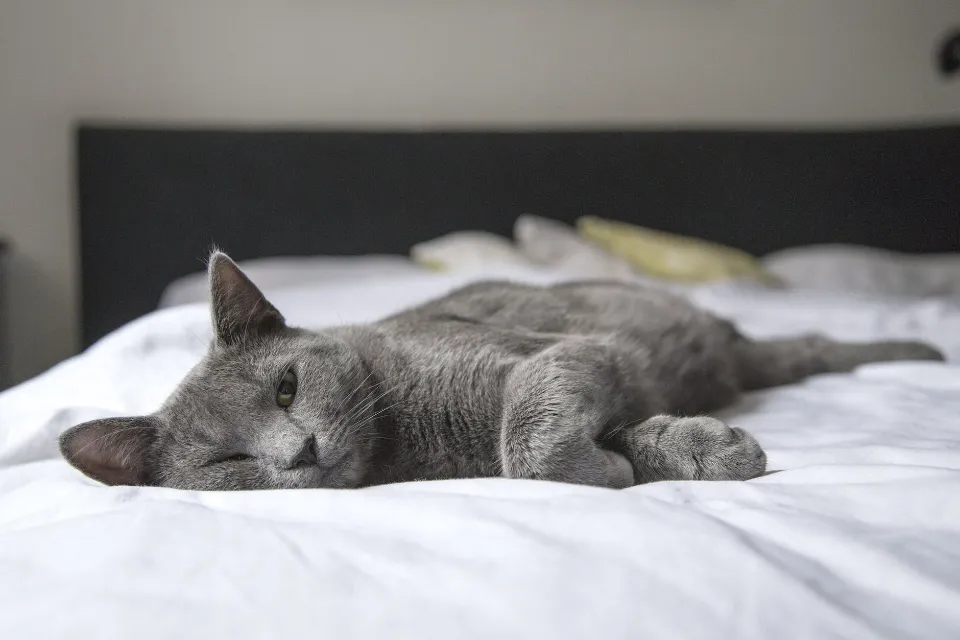
Need More Litter Boxes
If you have more than one cat, if your cat is still a kitten, or if you live in a large home with multiple stories, having multiple litter boxes can be especially helpful.
If you have more than one cat in your home, try to have as many litter boxes as there are cats so each cat can have their own. Make sure the litter boxes are all accessible.
Dislikes the Style of Their Litter Box
Despite the fact that pet parents prefer covered litter boxes, many cats won’t use them. Your cat might feel trapped inside these covered boxes, find the light in a covered litter tray too dim, or find the odors overwhelming. To see if a regular open litter is a better option for your cat, try providing it with one.
When it comes to litter boxes, size is important as well. If you have a kitten, be sure to give it a smaller, easier-to-access litter box. Make sure the sides are not too high so your cat can easily jump over them.
On the other hand, if your cat is larger than average, like a Maine Coon, make sure to give it a litter tray with lots of room for moving around and scratching.
Finds the Litter Unpleasant
Although you may not think it matters, your feline friend may care a great deal about the type of litter you use. Some cats will not use litter pans lined with corn or coconut-based lint. Cats won’t urinate or defecate close to food, and since cat litter made from these materials often smells more like food than a place to relieve oneself, your cat might not want to use the litter box.
Some brands of cat litter bother other cats’ feet, are too dusty, scented, or clumpy. The best thing to do is try experimenting with different types and brands of cat litter until you find one that your cat is happy to use.
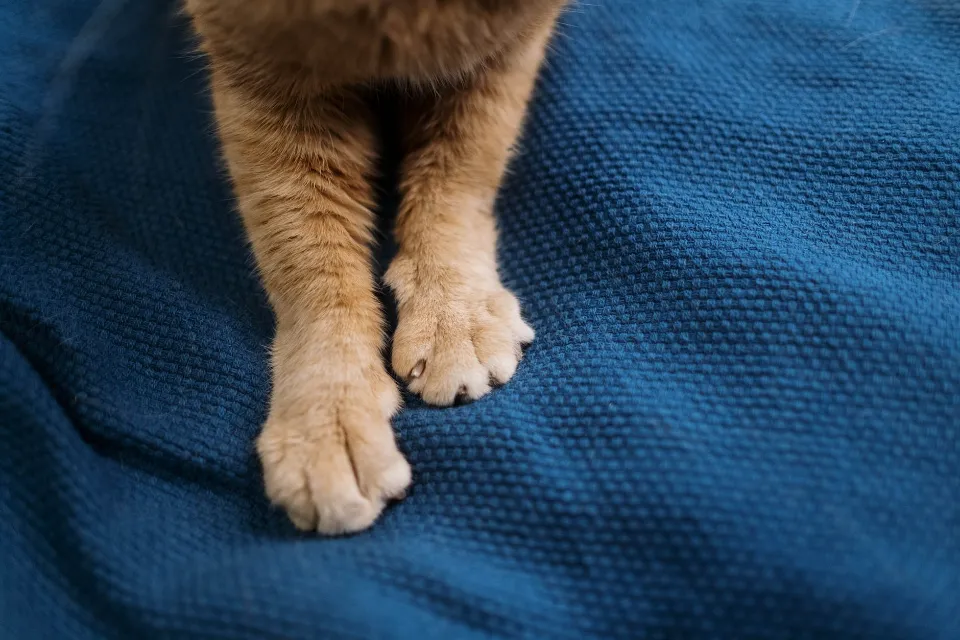
How to Get Cat Pee Out of Bedding?
To help stop your cat from peeing on your bed, thoroughly clean any bedding that he pees on. Your cat might be tempted to spray there once more if he can still smell the old pee. What is the best way to clean cat poop out of bedding?
First, clean the pee as quickly as possible. Look for items designed specifically to remove cat poop. Enzyme-based cleaners are best because they reduce the acid in your cat’s urine. Anything containing ammonia should be avoided because it has a faint cat pee smell and could draw your cat back to the area.
Cool water should be used to rinse the pee spot off the bedding; do not scrub it. After that, use a detergent and baking soda or cider vinegar mixture to wash the bedding in a washing machine. Add the enzyme cleaner to a second round if the laundry still smells after the first wash. Then air dry the bedding. In case the scent is still present, avoid using the dryer. Heat can lock in the scent. Before the smell is completely eliminated, you might need to wash the bedding more than once.
Make sure the surrounding bed frame and floor weren’t urinated on as well. With the cat urine cleaner you have, clean them. If your cat urinated a lot, you might even need to clean the mattress. Blot the area after first soaking it in water, then soak it for about 15 minutes in your enzyme cleaner. Then let it air dry.
Keep in mind that when your cat pisses on your bed, he is not being spiteful or mean. His only means of alerting you to the problem is through this. Avoid yelling at your cat or doing anything else that would make him feel uncomfortable. Instead, consult your veterinarian and heed the advice provided in this manual. With time, patience, and a lot of love, you’ll find the solution together and return your cat to a calm state of mind.
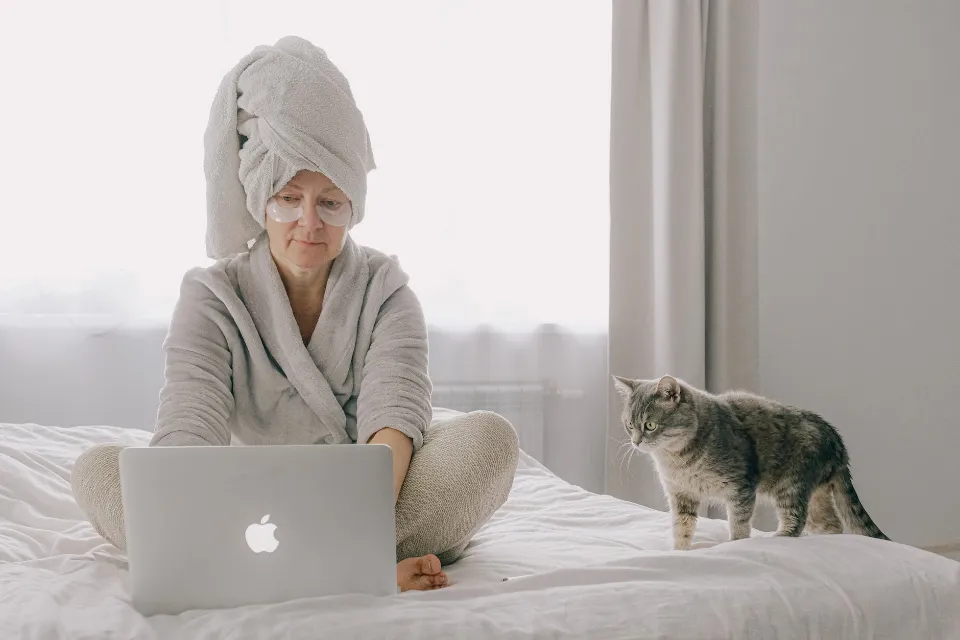
How to Get Cat Pee Out of Your Bed?
You should remove the stain as soon as you can after your cat urinated on your bed. Here’s how to do it.
Step 1: To begin with, use a towel to wipe away extra urine from the area where your cat urinated. “I do not recommend rubbing the area as this can spread the urine to a larger area,” Dr. Burch said.
Step 2: Spray the area with a mixture of vinegar and water. “Since odors tend to be alkaline, the vinegar being acidic will neutralize the smell,” Dr. Burch said.
Step 3: After letting the vinegar mixture sit for five to ten minutes, blot it with a towel to remove any excess moisture.
Step 4: Use a cleaner with enzymes. “Then I recommend spraying the area with an enzymatic cleaner to help break down the urine molecules to help remove the smell, especially to your pet’s senses,” Dr. Burch said.

How to Prevent Your Cat from Peeing on Your Bed?
You can deal with the issue more successfully if you figure out why your cat urinates on your bed. To rule out any medical issues, a trip to the veterinarian is imperative.
- Your cat’s stress can be reduced by using calming agents. Sending your feline friend in for a physical examination that includes a urinalysis and other diagnostic tests will help rule out conditions like urinary tract infections and renal issues.
- The problem won’t get better by yelling and getting angry at your cat. Because it makes your cat more anxious, it might do more harm than good.
- Deal with any potential litter box issues. Examine the area where it is, reassess the actual litter, and, if necessary, upgrade to more or larger boxes.
- Place the litter box away from loud noises, such as the laundry room, heavy traffic, or areas where a cat may be “caught” by a dog or other feline housemates. Your cat shouldn’t avoid the litter box if you can create a conducive environment for it.
- Make sure to thoroughly clean the area if you discover cat poop anywhere other than the litter box, like on your bed.
- Because cats are scent-seeking animals, they will associate the smell of cat litter with the bathroom and continue to relieve themselves there. You don’t want trap odors to exacerbate the issue you’re trying to solve. This guide is designed for you if you need advice on how to eliminate the smell of cat pee from your bed.
- You can even go so far as to make the area uninviting to your cat if he or she keeps urinating on the bed. When you aren’t in bed, some people advise covering the mattress with a shower curtain or another non-absorbent material to prevent your cat from peeing on it.
- By changing your cat’s behavior in a location, you can modify your cat’s mental association with your bed (or any other spot). Play with your pet or give him/her cat treats on the bed to help the cat associate the human’s bed with a feeding area rather than a peeing spot.
- This is advantageous because cats don’t like to defecate close to where they eat.
- Increased playtime with your beloved pet can also help your cat avoid any potential boredom problems. Cats need stimulating activities and exercise, and a deficiency in either is frequently disregarded as a contributing factor to inappropriate urination behavior.

FAQs
Why is My Cat Peeing on My Bed All of a Sudden?
Your cat may have a medical issue if it suddenly starts to pee on your bed after being completely housebroken. Your cat may urinate outside the litter box due to conditions like urinary tract infections, bladder infections, and bladder stones.
How to Get Cat Urine Smell Out of Linens and Clothing?
- Rinse the Area With Cool Water.
- Use detergent and baking soda or cider vinegar to wash the items.
- If the smell continues, add enzyme cleaner.
- After washing, let items air dry.
Summary: Why is My Cat Peeing on My Bed?
Your cat defecating on your bed could happen for a number of different reasons. The owner should first consult a veterinarian to perform a physical examination and any necessary diagnostic tests, such as a urinalysis, to make sure the cat does not have an underlying medical condition when it urinates somewhere other than in its litterbox. When he has a bladder infection, for example, your cat may associate pain or discomfort with the litterbox. The cat might then select a different location. Identifying the cause of the cat’s preference for the owner’s bed is necessary if the examination, urinalysis, and other diagnostic tests are all normal.
If you have any questions, please leave a comment. My Prime Home tries to give you the best home improvement information. Don’t forget to share the post. Thank you for reading.
You may want to know:
